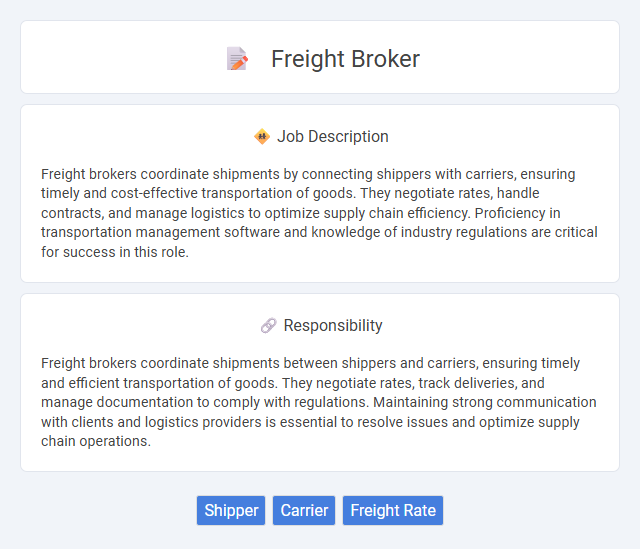
Freight brokers coordinate shipments by connecting shippers with carriers, ensuring timely and cost-effective transportation of goods. They negotiate rates, handle contracts, and manage logistics to optimize supply chain efficiency. Proficiency in transportation management software and knowledge of industry regulations are critical for success in this role.
Individuals who are highly organized, possess strong communication skills, and can handle fast-paced, high-pressure environments may find a freight broker job suitable. Those comfortable with complex logistics, negotiations, and multitasking are likely to succeed, while people who struggle with ambiguity or require a strict routine might find the role challenging. It is probable that adaptability, persistence, and problem-solving capabilities play key roles in thriving as a freight broker.
Qualification
Freight brokers must possess strong communication and negotiation skills, along with a thorough understanding of supply chain logistics and freight regulations. A high school diploma or GED is typically required, though many employers prefer candidates with a bachelor's degree in business, logistics, or a related field. Obtaining a freight broker license through the Federal Motor Carrier Safety Administration (FMCSA) and acquiring relevant industry certifications can significantly enhance job prospects.
Responsibility
Freight brokers coordinate shipments between shippers and carriers, ensuring timely and efficient transportation of goods. They negotiate rates, track deliveries, and manage documentation to comply with regulations. Maintaining strong communication with clients and logistics providers is essential to resolve issues and optimize supply chain operations.
Benefit
Freight broker jobs likely offer flexibility and the potential for high earnings based on commission, making them attractive to self-motivated individuals. Access to a broad network of carriers and shippers could enhance opportunities for growth and increased income. Risk management skills and market knowledge probably contribute to long-term success and job stability in this field.
Challenge
Freight broker jobs likely present challenges related to managing complex logistics and coordinating between multiple parties such as shippers and carriers. Navigating regulatory compliance and fluctuating market demands could require problem-solving skills and adaptability. Effective communication and negotiation may be essential to overcome obstacles and ensure timely deliveries.
Career Advancement
Freight broker careers offer substantial opportunities for advancement through gaining industry certifications, expanding logistics knowledge, and developing strong client relationships. Progression can lead to roles such as logistics manager, operations director, or owner of a freight brokerage firm. Mastery of transportation regulations and negotiation skills significantly enhances career growth potential in the freight brokerage sector.
Key Terms
Shipper
Freight brokers act as intermediaries between shippers and carriers, ensuring efficient transportation logistics and timely delivery of goods. By leveraging extensive networks and market data, freight brokers secure competitive rates and reliable carrier options tailored to the shipper's specific requirements. Their expertise reduces shipping complexities, enhances supply chain visibility, and optimizes freight costs for businesses managing regular or large-volume shipments.
Carrier
A freight broker connects carriers with shippers to ensure efficient transportation of goods across various regions. Carriers rely on brokers to secure consistent loads, optimize trucking routes, and increase fleet utilization. Effective communication and negotiation skills enable brokers to match carriers with freight that maximizes revenue while minimizing empty miles.
Freight Rate
Freight brokers negotiate competitive freight rates to maximize profitability and ensure cost-effective logistics solutions for shippers and carriers. These professionals analyze market trends, capacity fluctuations, and fuel prices to set dynamic rates aligned with industry standards. Effective rate management directly impacts shipment efficiency and customer satisfaction in the freight brokerage sector.
 kuljobs.com
kuljobs.com